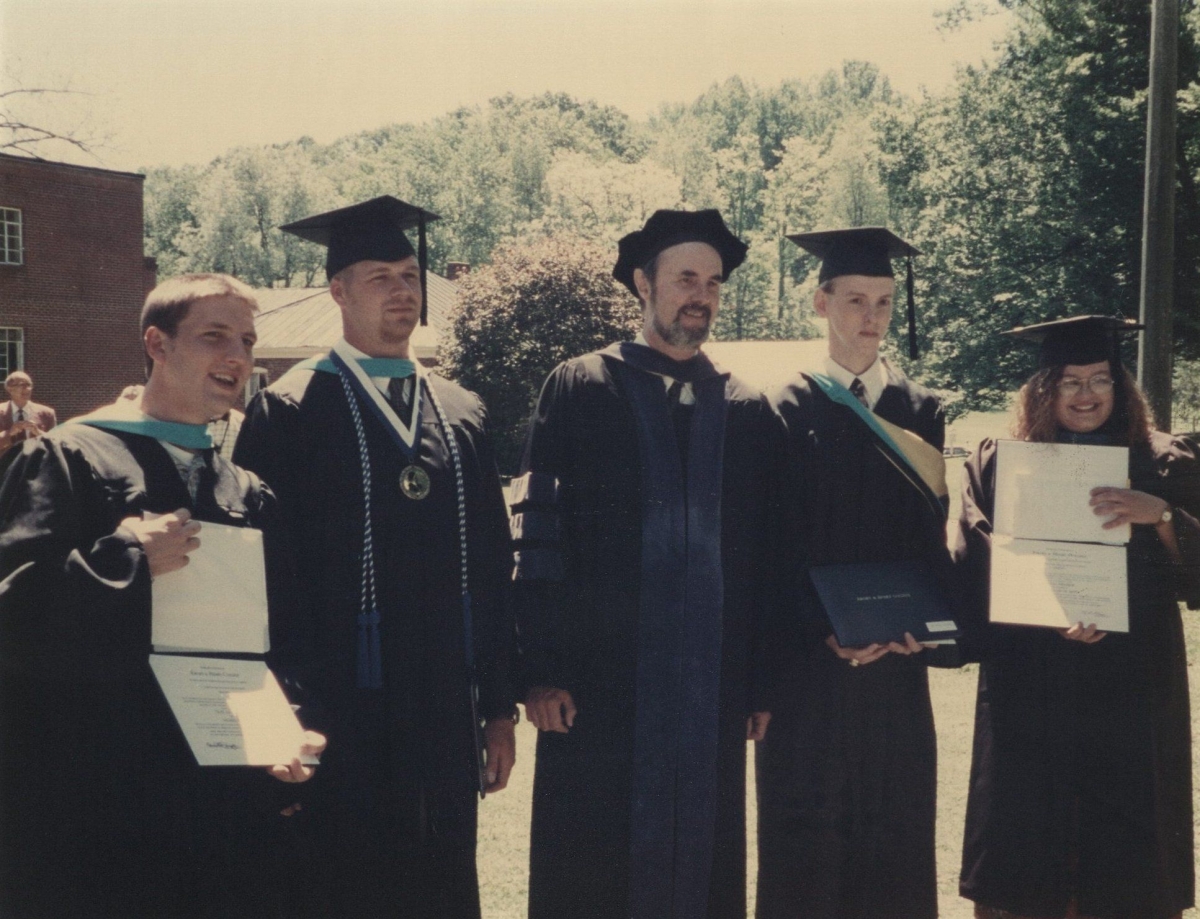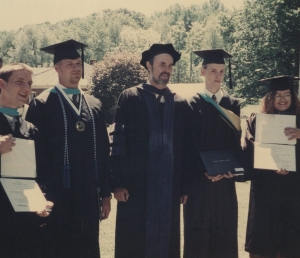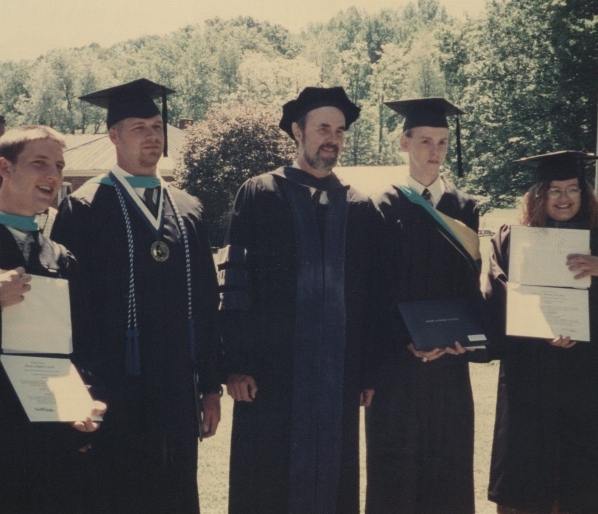This is a guest post by Jesse Barber, former Oral History Assistant in the Special Collections Research Center.
In August of 2024, Jesse Barber, a SCRC Oral History Assistant and Appalachian Studies MA graduate ‘24; and Greta Browning, SCRC Reference & Instruction Archivist and Curator, Rare Books and Manuscripts, traveled to Stephen Fisher’s home at his request to gather materials to be held in the Special Collections archive.
I traveled up to Emory & Henry University in Virginia with Greta Browning from the Special Collections at Appalachian State University to collect material from Stephen Fisher. I was told before the trip that he was a big deal in Appalachian Studies. I looked up an Appalachian Journal edition that he had edited in 1977 titled, A Guide to Appalachian Studies. All the Appalachian Studies greats were listed as the authors; Gaventa, Billings, Lewis, Jones. I read the introduction and was struck by how direct and relevant this essay was even today in the discipline. Some of the most potent lines from the introduction I’ll list here:
Harry Caudill charges that the schools [in Appalachia] “have educated their students for the outside world rather than for the building of prosperity and well-being at home.
Cratis Williams explains that most Appalachian colleges and universities have failed to identify themselves with Appalachia. The result is that the Appalachian student who attended a mountain college has done no more to help [themselves] become American while remaining Appalachian than [their] having attended a similar college outside the mountains would have done.
…refusing to promote regional consciousness…but actually encouraging them to get “educated” in order to “get out” of the region.
There now exists in Appalachian institutions of higher learning a number of Appalachian advocates who were born, raised, and educated in the region. These “ethnic volunteers” are committed to helping Appalachians become aware of their cultural heritage and the social, political, and economic forces which affect their lives.
I could go on…
Fisher’s home sat on a little hill near campus across the railroad tracks with a yard full of flowers and stately oak trees. His home was irregularly shaped, which I learned after speaking with him that his wife had designed it. They had been there for 35 years. He was in his robe and wore black minnetonka slippers when he answered the door. I reached out with my right hand to greet him when I noticed his bandaged hand and he informed us he had a fall recently. As he turned to walk us into his home, I realized the gravity of his aging health. Despite this, his mind was sharp and he talked with soft clarity, saying just enough as Greta and I sat and chatted before beginning our work.
As Greta got to work taking inventory I sat and visited with Fisher for a bit. I told him that I was an Appalachian Studies graduate, and he seemed to enjoy that and asked what was my area of focus. I told him that I did photo and video documentary work in the region. He then recounted his story of finding his way to App Studies, which wasn’t a discipline when he attended Wake Forest in 1963, though he was aware of his hillbilly persona from his peers. He told me how he would always win the Best Dressed Hillbilly Award from his fraternity, although the contest was based on flannel and overalls attire and he would wear a suit and tie. I had read through his bio he wrote in 2006 when he retired from Emory & Henry after 35 years of teaching, but I put aside my prior knowledge and listened to him tell it.
Greta and I sorted through his things, leaving pink sticky notes on shelves and items of interest to collect. We walked up the stairs, brushing past the stair assist chair. His office was a simple space with simple PCs from the early 2000s. The walls were shelved with books on Appalachian topics and ephemera he has collected through the years with one section being stacks of loose papers. I boxed up the filing cabinet after Greta demonstrated the correct way to stack and label and organize materials bound for the Special Collections. The hope is that the material carries the original organization as it was found. Cabinet 1, Drawer 2. Cabinet 1, Drawer 3, and so on. Flipping though his files was like flipping through his neural networks over the past three decades—everything he had learned, thought, found inspirational and experienced in his academic career. Topics included education, labor organizing, book reviews, and of course, Appalachian environmental activism.
Flipping through this archive felt like seeing the process of Fisher's experience during his tenure in the region. His bookshelves were sectioned off into topics: law, labor, sex and gender studies, to name a few. If only I could pour over every page, every speech, every letter sent and received, every essay written, every article clipped, I’d be better for it. Maybe then, I could see the world in its clarity as he saw it, as I had heard in his voice and seen in his eyes.
Greta found a binder, filed with order like the rest of his archives, that was full of letters that previous students and colleagues had sent him of their appreciation of Fisher as an educator and mentor. While Greta and I worked, Fisher flipped through every page appreciating the kind words said about him. When he finished, he handed it back to Greta and said, “take it.” He expressed how he wished he had looked at that binder sooner, an item among his archive that he had accidentally overlooked. This item felt personal, and Greta graciously reminded him that we didn’t have to take it. “I don’t need it anymore,” Fisher said. He said this with clarity of understanding his reality and his continued hope that all he had learned and experienced could and should be passed on to the next generation as he had practiced everyday with his students.
Greta and I returned to Appalachian State and unloaded the 20-something neatly packed boxes full of files and stacked them under the clinical fluorescent lights in a storage closet in the library to be sent to the blast freezer to get rid of mold, then to be processed by an archivist, devoid of their original environment, from their organic creator. The Special Collections are full of such materials, that were once alive and handled and captured thoughts and feelings and shared ideas of living folks. The hope is that those of us outside of the archives become invested and curious and connected to something in the world so deeply that it drives us to go seeking among these materials—that hopefully these living ideas don’t stop with one person. Donating these materials are letting others into the fold so we can all become co-creators and co-authors for future knowledge and understanding of who we all are.

--Contributed by Jesse Barber
(An obituary of Dr. Stephen Fisher may be found here: https://www.seaverbrown.com/obituaries/stephen-fisher, from Fraziers' Seaver Brown Funeral Service, Marion, Virginia)

